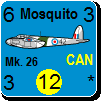Ormbane
Posts: 80
Joined: 5/17/2013
Status: offline

|
In the book Rising Sun, Falling Sky the author does document problems that arose within ABDA because of differences in doctrine, language, logistics, tactics, etc. Of course, this was primarily involving naval forces and to a lesser extent air forces. Whether or not the outcome would have been appreciably different in the early days of the Japanese efforts in the Pacific is debatable, but probably not.
In Atkinson's trilogy on the US in the European and Mediterranean theaters of WW2 he also documents various frictions and inefficiencies, but again it is not clear that the ultimate outcome would have been different. Of course, there were also frictions and inefficiencies even within the same military forces, such as within US Army forces or with inter-service rivalries, etc.
In more recent times the US has learned some hard lessons about problems that may occur by mixing even US forces without a proper command structure, and we have also made some (limited) efforts to standardize weapons and ammunition with NATO allies, to attempt to reduce logistical problems. Soldiers without bullets are less effective, obviously.
On the other hand, there was the example of "The Devil's Brigade" which won several unit citations in WW2 and was composed of both Canadian and US nationals. But in this case they trained together, fought together, and supported each other in barroom brawls.
If this game were to impose any penalty for having mixed units under a HQ I would think that it would be in the area of logistics.
|
 Printable Version
Printable Version












 New Messages
New Messages No New Messages
No New Messages Hot Topic w/ New Messages
Hot Topic w/ New Messages Hot Topic w/o New Messages
Hot Topic w/o New Messages Locked w/ New Messages
Locked w/ New Messages Locked w/o New Messages
Locked w/o New Messages Post New Thread
Post New Thread